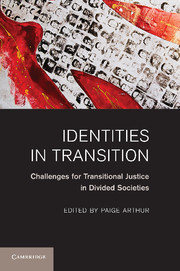Book contents
- Frontmatter
- Contents
- Acknowledgments
- Author Bios
- Introduction: Identities in Transition
- PART I IDENTITY IN TRANSITIONAL JUSTICE MEASURES
- 1 Indigenous Peoples and Claims for Reparation: Tentative Steps in Peru and Guatemala
- 2 Truth Telling, Identities, and Power in South Africa and Guatemala
- 3 Security System Reform and Identity in Divided Societies: Lessons from Northern Ireland
- 4 Staging Violence, Staging Identities: Identity Politics in Domestic Prosecutions
- 5 International and Hybrid Criminal Tribunals: Reconciling or Stigmatizing?
- 6 Silences, Visibility, and Agency: Ethnicity, Class, and Gender in Public Memorialization
- PART II IDENTITIES, TRANSITION, AND TRANSFORMATION
- Index
1 - Indigenous Peoples and Claims for Reparation: Tentative Steps in Peru and Guatemala
Published online by Cambridge University Press: 01 March 2011
- Frontmatter
- Contents
- Acknowledgments
- Author Bios
- Introduction: Identities in Transition
- PART I IDENTITY IN TRANSITIONAL JUSTICE MEASURES
- 1 Indigenous Peoples and Claims for Reparation: Tentative Steps in Peru and Guatemala
- 2 Truth Telling, Identities, and Power in South Africa and Guatemala
- 3 Security System Reform and Identity in Divided Societies: Lessons from Northern Ireland
- 4 Staging Violence, Staging Identities: Identity Politics in Domestic Prosecutions
- 5 International and Hybrid Criminal Tribunals: Reconciling or Stigmatizing?
- 6 Silences, Visibility, and Agency: Ethnicity, Class, and Gender in Public Memorialization
- PART II IDENTITIES, TRANSITION, AND TRANSFORMATION
- Index
Summary
Reparations for victims of gross human rights violations are an increasingly common feature in postauthoritarian and postconflict societies dealing with the legacy of a violent past. This trend is confirmed by the recommendations of several truth commissions and by the jurisprudence of both national and international human rights bodies, including the European and the Inter-American Courts of Human Rights. National governments, such as those of Argentina, Chile, Brazil, and South Africa, among others, have adopted reparations initiatives as one among several transitional justice measures. This addition to prosecutions and to truth commissions as the basic transitional justice “tools” has been endorsed by the UN in, among other documents, its Basic Principles and Guidelines on the Right to a Remedy and Reparation for Victims of Gross Violations of International Human Rights Law and Serious Violations of International Humanitarian Law, which was adopted by its General Assembly in 2005. The conviction represented in this trend is that doing justice in transitional scenarios requires not only doing something against the perpetrators but also doing something specifically for victims.
There are competing visions about what the ultimate goal of reparations should be. In this chapter we will assume that, in situations of large-scale violence and repression like the ones we will describe, reparations are best conceptualized as rights-based political projects aimed at giving victims due recognition and enhancing civic trust both among citizens and between citizens and state institutions.
- Type
- Chapter
- Information
- Identities in TransitionChallenges for Transitional Justice in Divided Societies, pp. 17 - 53Publisher: Cambridge University PressPrint publication year: 2010
- 1
- Cited by



